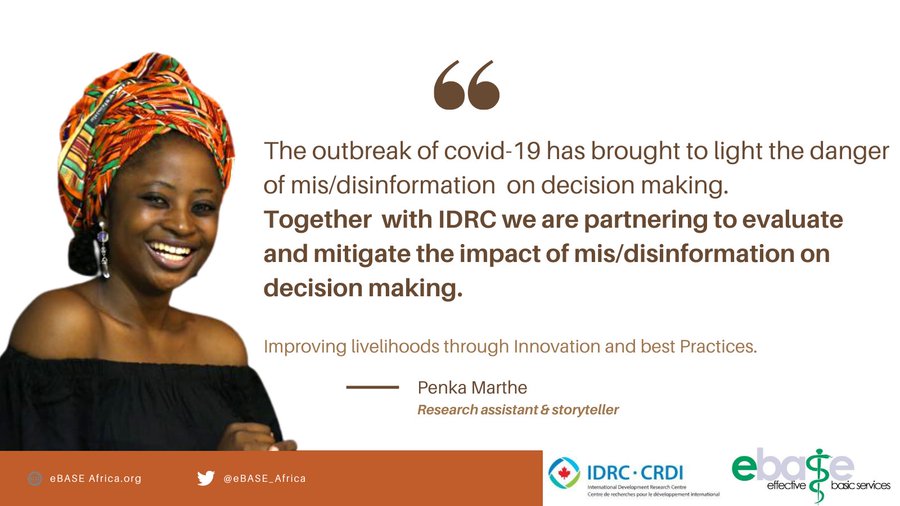
Image source: eBASE Africa
IDRC Supports eBASE Africa Assess the Impact of Mis/Disinformaion on use of Research Evidence in Public Policy Decision Making in West and Central Africa in a Season of COVID-19 Pandemic
With funding from the International Development and Research Center in Canada, eBASE Africa is assessing the impact of mis/disinformation on research use in policy in west and central Africa. This project is also supporting two postgraduate students to use this topic in their master’s degree dissertation and PhD thesis. The team at eBASE Africa are working in difficult conditions of conflict and COVID-19 pandemic.
“COVID-19 is not just a health crisis, but a communications emergency as well. When misinformation spreads, the public loses trust and too often makes decisions that hamper the public response and even their own lives” I quote Melissa Fleming UN Under-Secretary-General for Global Communications. The role of misinformation and disinformation on the use of research evidence in public policy decision making is so outrageous to be ignored. The outbreak of covid 19 has revealed the urgency of mitigating the impact of disinformation and misinformation on evidence inform decision making. Before covid 19 other sectors like education of the girl child, Climate Change and Food Security, Mother and child health, Advocacy against early marriage and sexual violence, Women empowerment, have been highly affected with misinformation and has always been on the downlow. Covid 19 been a global issue has exposed the risk mis/disinformation could have on the use of research evidence on decision making predominantly in Africa. Even if it’s true that covid 19 is a health crisis, with the current realities, one without hesitating, will agree with Melissa that it is also a communication emergency. WHO estimates that in the first 3 months of 2020, nearly 6 000 people around the globe were hospitalized because of coronavirus misinformation.
This situation of mis/disinformation affecting the uptake of research evidence is worsened in this era of growing prominence of social media and a high choice of news media environment. As public policy makers are primarily citizens, they are also influenced by infodemics and this could influence public policies. Policy makers think about how citizens will react to their policies, and this could determine if they will push forward evidence-based policies or just flow with non-evidence based policies.
While disinformation could be false information that is spread with the specific intention of misleading or deceiving people, on the other hand misinformation is more generally refers to false information, regardless of whether it’s intended to mislead or deceive people. These phenomena could greatly affect decision making by policy makers and the public. This is because policy makers and the public lack the capacity to appraise research evidence or lack of access to research evidence. It is therefore of great importance to investigate this wicked problem by gathering the body of evidence on the mechanisms, channels, and impact of mis/disinformation.
Thanks to AEN recommendation, eBASE Africa is proud to announce they are the beneficiaries of the prestigious Rachel DesRosiers Alumni Award, for the project: Impact of Misinformation and Disinformation on the Use of Research Evidence in Public Policy Decision Making. Together with IDRC we set out to assess the impact of misinformation and disinformation on the use of research evidence in public policy decision making in West and Central Africa and to develop recommendations in the form of approaches to mitigate its impact.
Nothing more exciting than collaborate with IDRC to fight for such a cause; given the fact that enhancing the use of research evidence by policy makers and the public at large remains our passion. Through this research we hope to bring more to the evidence ecosystem by promoting the use of evidence informed decision making in West and Central Africa. To do this, we are conducting a scoping review of cases of misinformation and disinformation affecting the use of research evidence in decision making, the mechanisms of misinformation and disinformation, enablers, perpetrators, strategies used to mitigate misinformation and disinformation, existing evidence on factors informing public policies in West and Central Africa including the impact of disinformation and misinformation on use of research evidence. We are focusing on issues around COVID-19 pandemic and other key sectors contributing to SDGs like education of the girl child, Climate Change and Food Security, Mother and child health, Advocacy against early marriage and sexual violence, Women empowerment.
This scoping review consist of case studies of 47 selected projects of the existing literature on the impact of disinformation and misinformation on the use of research evidence in public policy decision making in 3 West and Central African countries (Nigeria, Cameroon, and Senegal). Cardinal and subcarinal criteria were used in the selection of these projects and countries to ensure equal representation of countries and projects in the study. Our cardinal criteria focused on country, language, and status of the project while our sub cardinal criteria looked at IDRC mis/disinformation sectors of interest, participants and beneficiaries and countries in conflict and non-conflict settings. We are also carrying out a Delphi survey with the objective to explore existing IDRC and other development research projects that have developed evidence for decision making. We are examining if research evidence was used in policy making following research and if mis/disinformation affected the use of such evidence.
To keep you posted with the unfolding results please follow us on twitter @eBASE_Africa an @SofiesVoice.
Acknowledgements
The views expressed in published blog posts, as well as any errors or omissions, are the sole responsibility of the author/s and do not represent the views of the Africa Evidence Network, its secretariat, advisory or reference groups, or its funders; nor does it imply endorsement by the afore-mentioned parties.